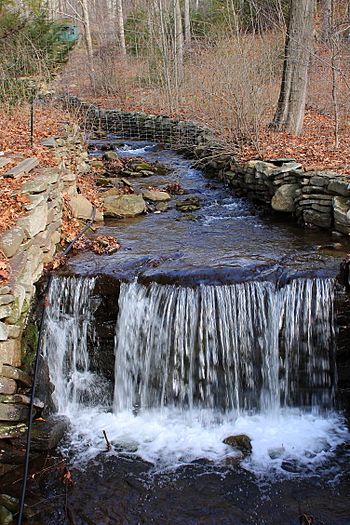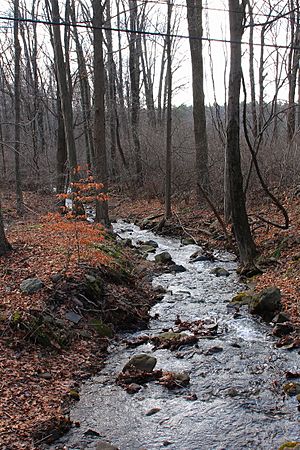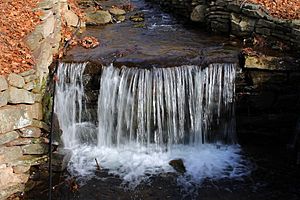Maple Run facts for kids
Quick facts for kids Maple Run |
|
|---|---|

Maple Run looking upstream
|
|
| Physical characteristics | |
| Main source | eastern side of Grand View in Fairmount Township, Luzerne County, Pennsylvania between 2,200 and 2,220 feet (670 and 680 m) |
| River mouth | Kitchen Creek in Fairmount Township, Luzerne County, Pennsylvania 994 ft (303 m) 41°15′58″N 76°15′35″W / 41.26605°N 76.25962°W |
| Length | 5.2 mi (8.4 km) |
| Basin features | |
| Progression | Kitchen Creek → Huntington Creek → Fishing Creek → Susquehanna River → Chesapeake Bay |
| Basin size | 4.17 sq mi (10.8 km2) |
| Tributaries |
|
Maple Run is a stream that flows into Kitchen Creek in Luzerne County, Pennsylvania. It's about 5.2 miles (8.4 km) long. The stream flows through Fairmount Township. The land area that drains water into Maple Run is about 4.17 square miles (10.8 km2).
Maple Run has several smaller streams that join it, but none of them have official names. Part of the stream is a special area called "Class A Wild Trout Waters" because it's a great home for brook trout. These trout live all along the stream. You can find different types of soil and rocks near Maple Run, like alluvium (river deposits) and glacial till (rocky material left by glaciers). There are also rocks like sandstone and shale. At least two bridges cross the stream, and a sawmill was built here a long time ago in the early 1800s.
Contents
Where Maple Run Flows
Maple Run starts on the eastern side of a mountain called Grand View in Fairmount Township. It flows southeast for a short distance, running next to Pennsylvania Route 487. Then, it turns south and a little east, entering a very deep and narrow valley. The stream continues to flow alongside Pennsylvania Route 487.
After a while, Maple Run slowly turns southwest. It leaves the narrow valley and a small, unnamed stream joins it from the right side. The stream then turns south-southeast and enters a wider, shallower valley. It stops flowing next to Pennsylvania Route 487 and instead flows alongside State Route 4013.
After some distance, it crosses Pennsylvania Route 118. It then flows through a wetland area and another unnamed stream joins it from the left side. After more than a mile, a third unnamed stream joins it from the left. Maple Run also flows near the community of Mossville. The stream then turns almost directly south, and its valley becomes much narrower and deeper again. After a short distance, it turns east-southeast and flows in that direction for a while. Finally, one more unnamed stream joins it from the left before Maple Run meets Kitchen Creek.
Maple Run joins Kitchen Creek about 3.08 miles (4.96 km) upstream from where Kitchen Creek ends.
Water, Land, and Rocks
The water in Maple Run has a low amount of alkalinity, which is a measure of how well water can neutralize acids. It's about 5 milligrams per liter.
The elevation near where Maple Run joins Kitchen Creek is 994 feet (303 m) above sea level. The place where the stream starts is much higher, between 2,200 and 2,220 feet (670 and 680 m) above sea level.
For a large part of its journey, Maple Run flows over alluvium. This is a type of soil made of sand, silt, and clay that rivers deposit. It's mostly found in the middle parts of the stream. This alluvium can be about 6 feet (1.8 m) thick and contains some large boulders, especially closer to where the stream begins.
Underneath the alluvium are loose deposits left by glaciers. There are also areas where the stream flows over bedrock made of sandstone and shale, especially near its source. In its middle section, just south of Pennsylvania Route 118, the stream flows through a small wetland.
A pipeline crosses Maple Run about 2.4 miles (3.9 km) downstream from where the stream starts.
Maple Run's Watershed
The watershed of Maple Run covers an area of 4.17 square miles (10.8 km2). This is the entire area of land where all the rain and snowmelt eventually drain into Maple Run. The stream is located entirely within the area covered by the United States Geological Survey map called "Red Rock."
There is a small pond on or near Maple Run, about 1,000 feet (300 m) north of Mossville. In 1978, a state water plan looked at this pond as a possible place for a reservoir that could be used for many purposes. They called it "Small Potential Reservoir #36-10."
History of Maple Run
Maple Run was officially added to the Geographic Names Information System on August 2, 1979. This system keeps track of names and locations of places in the United States.
In 1820, a hunter and sawmill worker named Peter Boston settled on Maple Run. This was in the south-central part of Fairmount Township. At that time, it was part of Huntington Township. He was one of the first people to settle in the area. Joseph Moss also settled in the valley of the stream, south of Peter Boston, in the early 1800s. Later in the 1800s, the Moss Methodist Church and the Moss Schoolhouse were built in this area.
The first roads in Fairmount Township followed Maple Run, going west and northwest. In 1837, Shadrach Laycock and Peter Boston built the first sawmills in Fairmount Township. These sawmills were on Huntington Creek and Maple Run.
A special type of bridge called a prestressed box beam bridge was built over Maple Run in 1977. It is 32.2 feet (9.8 m) long and carries T-677 and Tripp Road. A concrete culvert bridge was built over the stream in 2007. This bridge is 23.0 feet (7.0 m) long and carries State Route 4013.
Animals and Biology
A section of Maple Run, from its beginning down to where the pipeline crosses it, is considered "Class A Wild Trout Waters" by the Pennsylvania Fish and Boat Commission. This means it's a very good habitat for brook trout. This special section is 2.4 miles (3.9 km) long. However, trout naturally reproduce and live throughout the entire stream.



